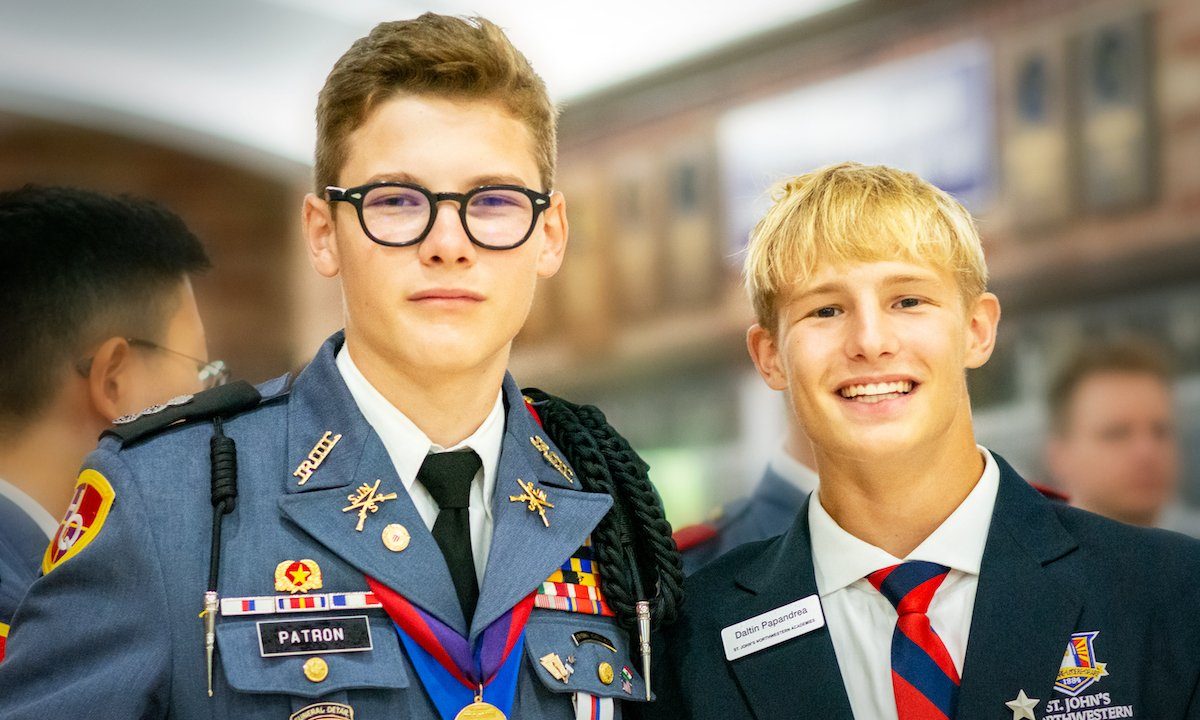Chicago Parent – 5 Competencies That All Leaders Need

Jennifer Kales – CHICAGO PARENT: What makes a good leader? And how do you help your child become one? Many parents are finding that getting back to the basics and teaching kids important traits is the key to good leadership. What’s more, the right education will support young people not just academically, but by incorporating social-emotional skills into their everyday lives.
Robert J. Fine, Jr., President of St. John’s Northwestern Academies (SJNA), a coed independent boarding and day school located in Delafield, Wisconsin, is no stranger to youth leadership.
“Our students exhibit leadership each day. It’s an innate part of our school culture and curriculum,” he says.
St. John’s Northwestern Academies is about a 90-minute drive from Chicago and offers both a traditional Military Academy and a Prefect Academy. While both academies hold the same standards of excellence in academics and behavior, each takes a different approach.
Here, Fine shares wisdom about the five competencies that all leaders need:
Accountability
This is one of the most important aspects of leadership and success, Fine says.
“At our Prefect Academy, we have a student mentorship model,” says Fine. “This means that under the guidance of our faculty and staff, students are given latitude to monitor their peers, everything from running room inspections to helping fellow students get the specific academic tutoring they may need.”

Mentors learn the nuances and responsibility of leadership, while mentees learn to be accountable to not only their peer leaders but also to themselves.
Initiative
The ability to take initiative is a quality that will affect all areas of life, and it’s an important leadership skill. Whether it’s by becoming a student mentor, joining the student government, or spearheading a volunteer project, SJNA students are encouraged to be self-starters and take the lead.

“We had one student join us and on day one they had the idea to start a foundation that would help build wells in Africa,” Fine says. “This project was entirely student-directed. We encourage and support our students in these types of efforts, but they will be the ones leading the charge.”
Encouraging young people to be self-starters not only builds a student’s confidence but also allows them an opportunity to see how their individual ideas and actions will affect outcomes, which in turn, builds leadership qualities.
Respect
Respecting others as well as yourself is an important component of any leader. Respect takes many forms at SJNA, from respecting your environment by following company rules regarding dorm cleanliness to respecting yourself and others by presenting a polished appearance.
“For us, an important component of respect is a standard of behavior, whether it is a polite greeting, a firm handshake, or looking the other person in the eye when you speak,” says Fine. “By expecting this from our students, we are creating young adults who are poised and comfortable dealing with people and they leave a good impression on everyone they meet.”
Awareness
With our society becoming increasingly global by the day, being aware means that you understand the greater world around you. Fine believes that it’s important that young people are exposed to a global philosophy.
Awareness of different practices and cultures encourages students to listen, understand, and be more adaptable — all hallmarks of leadership.
Fine notes that St. John’s Northwestern Academies is made up of scholars from nations all over the world, exposing students to many cultures, personalities, and ways of thinking.
“Our students are more worldly, mature, and aware than many of their peers because they are used to dealing with an incredibly vibrant and diverse student population,” he says. “The innate nature of our school ensures that our students are not only good citizens but also good global citizens.”

Resilience
Learning to overcome adversity is another key to success. Kids need to learn that they can fail, fall down and make mistakes without it defining them. In addition, as we have emphasized in recent years, young people are sometimes called upon to adapt to situations beyond their control. Leaders aren’t perfect, but they are resilient.
Fine believes that the importance of resilience can’t be emphasized enough: “Everyone is going to face disappointment in life. We teach our students to deal with failure, overcome it, and learn from it.”
Read more at the Chicago Parent:
